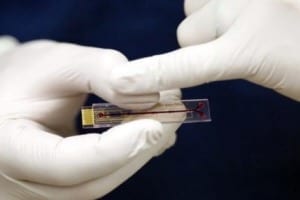
Determining how effectively a drug is being absorbed by the human body is a tricky business.
While age and weight can give doctors a good indication, a patients’ metabolism, the foods they eat and other drugs they might be taking can all have an effect on efficacy.
Looking to solve this problem, engineers from the University of California, Santa Barbara have developed an implantable device that provides real time feedback on how much medication is currently in a person’s bloodstream.
While still in the early stages of development, the researchers say the prototype device, called MEDIC (Microfluidic Electrochemical Detector for In vivo Concentrations), could revolutionise the way treatment is given and measured in the future.
Kevin Plaxco, a professor of biomolecular science and engineering, believes it could even be used to deliver drugs automatically, with dosages based on the feedback generated by the device.
An artificial pancreas, which monitors glucose levels in diabetics and uses this information to inject a controlled amount of insulin, is an example of one such system.
The MEDIC device consists of a microfluidic chamber lined with gold electrodes from which drug-recognising biomolecules – in this case artificial DNA strands called aptamers – extend.
When the target molecule comes in contact with an aptamer, the strand recognises it and wraps around the molecule, delivering electrons from its tip to the electrode at the aptamer’s base. The tiny jolt of current signals the presence of the molecule.
Because previous iterations of the device failed within half an hour – due to the components in whole blood clinging to the sensors – the researchers decided to introduce a second flow into the chamber.
This acted like a filter, separating the large blood components from the small drug molecules.
In tests, the researchers found they could easily and accurately measure the effectiveness of a particular drug in the bloodstream, even when a cocktail of drugs was administered.
The Latest on: Drug levels in the bloodstream
[google_news title=”” keyword=”Drug levels in the bloodstream” num_posts=”10″ blurb_length=”0″ show_thumb=”left”]
via Google News
The Latest on: Drug levels in the bloodstream
- Calls to strengthen drugs policy in rugby leagueon April 30, 2024 at 9:44 am
A coroner has asked rugby league's governing body to consider changing its drugs policy following a player's death. Archie Bruce, 20, died in a hotel room in Toulouse with drugs and alcohol in his ...
- UC study on diabetes medication focuses on how long blood sugar control can be maintainedon April 30, 2024 at 9:15 am
Researchers at UC have just released a new study that shows how a new medication needs to be developed to help treat people with type two diabetes.
- Is Ozempic the New Anti-Inflammatory Wonder Drug?on April 30, 2024 at 4:00 am
Some GLP-1s are now FDA approved for chronic weight management, including Wegovy (semaglutide) and Saxenda (liraglutide), while others like Ozempic (semaglutide) are approved for type 2 diabetes but ...
- A Colorado board wants to lower prescription drug costs. Why are so many patients opposed?on April 30, 2024 at 2:03 am
Colorado's Prescription Drug Affordability Board is trying to reduce the cost of medicine, but patients worry it could hurt access.
- X4 enters commercial fold with FDA approval of rare disease drug Xolremdion April 29, 2024 at 8:29 am
With the approval of X4 Pharmaceuticals’ first product mavorixafor, there’s a new commercial rare disease player in town. | Following a 10-year development journey, the FDA on Monday approved X4 ...
- Experimental drug shields pancreas from type 1 diabetes attackon April 29, 2024 at 8:21 am
Scientists at Johns Hopkins Medicine say that an experimental monoclonal antibody drug called mAb43 appears to prevent and reverse the onset of clinical type 1 diabetes in mice, and in some cases, to ...
- Common Blood Pressure Drug Increases Lifespan And Slows Aging in Animalson April 26, 2024 at 4:30 pm
The hypertension drug rilmenidine has been shown to slow down aging in worms, an effect that in humans could hypothetically help us live longer and keep us healthier in our latter years. Previous ...
- Weight Loss Drug Zepbound May Help Sleep Apnea, Study Findson April 26, 2024 at 7:34 am
The U.S. Food and Drug Administration (FDA) approved Zepbound for the treatment of obesity in November 2023. Some prescribe the weekly injection off-label to those with sleep apnea, driving Eli Lilly ...
- A Closed-Loop Drug-Delivery System Could Improve Chemotherapyon April 25, 2024 at 3:19 pm
New CLAUDIA system could continuously monitor patients during an infusion, adjust dosage to maintain optimal drug levels ...
- What is high cholesterol and can statin drugs help? Here are 3 things to knowon April 25, 2024 at 2:01 am
There can be a genetic link for high cholesterol, but for the majority of us, lifestyle and diet will be the key deciding factors in how high it goes.
via Bing News









